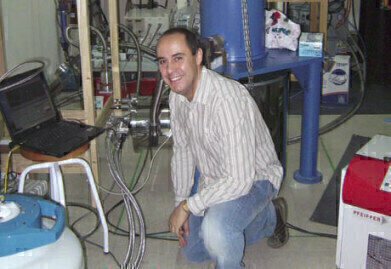-
 Dr EnriqueDiez
Dr EnriqueDiez
News & views
Cryogen-free Technology Facilitates Graphene Studies
Mar 16 2011
A Cryofree® dilution refrigerator installed at Salamanca University is helping scientists carry out studies on graphene, recently recognised for its importance through the 2010 Nobel Prize in Physics Award. Dr Enrique Diez moved from Princeton University, USA, to head research into magneto-transport in nanoelectronic devices at the university based in Spain.
“When I set-up my laboratory, we came to the conclusion that technologies based on the use of liquid helium were no longer sustainable. We looked at new environmental-friendly technologies which could provide ultra-low temperature and high-magnetic field environments, without the need for liquid helium,” said Dr Diez.
The refrigerator system supplied by Oxford Instruments and purchased using EU Feder funds, will enable continuous measurements from 10 mK up to 40 K from one cryostat. “We can also use the magnet cryostat as stand-alone for quantum hall measurements at room temperature. This is particularly useful as graphene, a new material first created in 2003 by Drs Geim and Novoselov (Winners of the 2010 Nobel Prize in Physics) from Manchester University, exhibits Quantum Hall plateaus at room temperature.”
Dr Diez has looked closely at the temperature dependence of the plateau-plateau and plateau-insulator transition in graphene and reported the first measurement of the scaling exponent for the plateau-insulator quantum phase transition in graphene over the last two years and plans to extend the studies on graphene to lower temperatures.
Digital Edition
Lab Asia 31.6 Dec 2024
December 2024
Chromatography Articles - Sustainable chromatography: Embracing software for greener methods Mass Spectrometry & Spectroscopy Articles - Solving industry challenges for phosphorus containi...
View all digital editions
Events
Jan 22 2025 Tokyo, Japan
Jan 22 2025 Birmingham, UK
Jan 25 2025 San Diego, CA, USA
Jan 27 2025 Dubai, UAE
Jan 29 2025 Tokyo, Japan


















